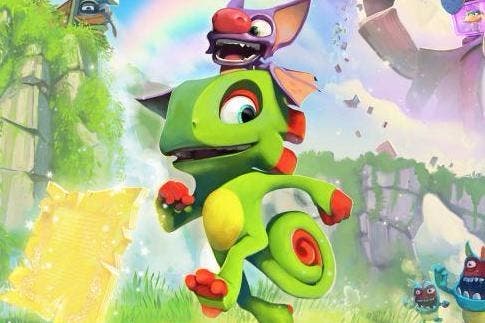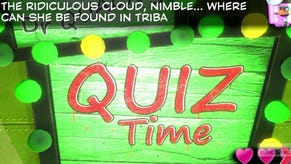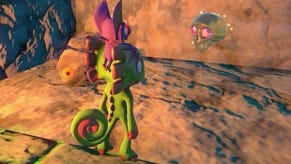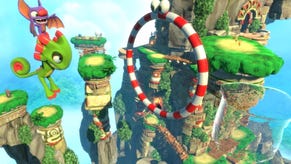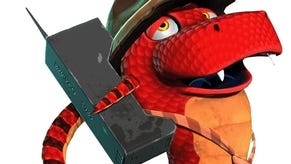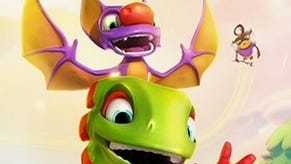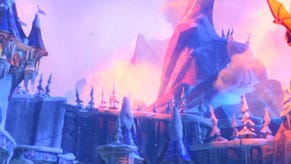Yooka-Laylee review
Medium Rare.
Whatever else it is, Yooka-Laylee is one gigantic joke at its own expense. The game's surprisingly beefy script seemingly can't go a moment without poking fun at itself and video game foibles at large - everything from the level design's love of bobbing collectibles through optical drive loading times to how much cash developer Playtonic blew on the boss battles.
Many of these in-jokes are distinctly contemporary - there are a couple of gags about crowdfunding that may not entirely amuse the project's Kickstarter backers - but the majority take aim at the golden age of early 3D platforming, before the first-person shooter became the console industry's flagship genre. The game's grand yet dinkily styled, themepark environments teem with retro parodies, all of whom express themselves in authentically inane, pre-CD-ROM gibberish. Among other dramatis personae, you'll tangle with a maniacal low-res arcade mascot who presides over clumps of coin-op mini-games, a stony goliath perched atop a series of ramps, like the Whomp King in Super Mario 64, and a jovial minecart who pines for the days when hurtling along a rail was a charming novelty rather than the hoariest of cliches.
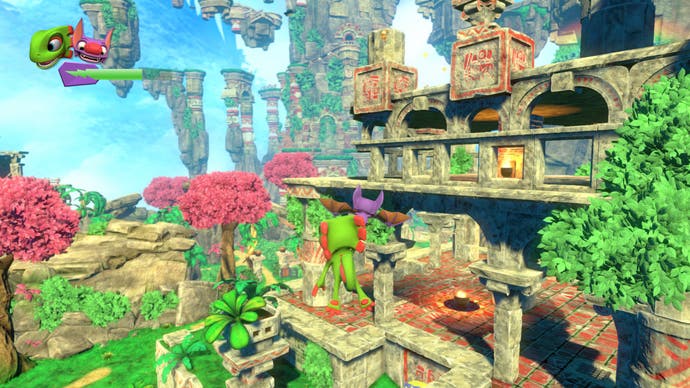
As is often the case with this kind of humour, the self-awareness is by turns infectious and grating - jokes about unskippable dialogue and quality assurance are only so funny when they occur in a game that does, in fact, feature the odd wodge of unskippable dialogue and a rather unwieldy camera. The aggressively ironic tone also betrays a certain insecurity about whether the type of game Yooka-Laylee aims to be still merits attention, a commitment to making light of the whole enterprise lest it prove surplus to requirements. After 15 or so hours with the game I can answer that yes, there's still call for a platformer of this hue today, but Playtonic's devotion to the classics does feel like more of a check than an advantage in places, and the execution is a little too uneven for comfort.
As the title suggests, Yooka-Laylee is a Banjo-Kazooie reboot in all but name, crafted by Chris Sutherland, Steve Mayles, David Wise and other members of the original Banjo team to fill the void left by Rare's transition away from the franchise under Microsoft. In place of Banjo's bear-and-bird double act it gives us a bat riding a chameleon's head, on a quest to rescue a magic book from an insect arch-entrepreneur, Capital-B - a quest that sees you gathering up to 150 shimmering, grinning Pagies to access worlds sealed away in other magical tomes, dotted across your adversary's capacious factory-lair.
If there are different species in play, there's plenty of cross-over between franchises in terms of each duo's abilities. Unlocked as you visit each world and push further into Capital-B's mansion, Yooka-Laylee's moveset is a generous if well-travelled one, extending from bread-and-butter basics like the double-jump and gliding to advanced tricks such as the ability to turn invisible or walk underwater by farting out a bubble of air.
Yooka can also gobble down berries to spit grenades or snowballs among other projectiles - feats of markmanship that go hand in hand with simple door-and-switch puzzles or (more problematically) arcade shooting gallery sequences. Laylee will eventually learn to burp stunning sonar waves, generate a force shield or perform an area-of-effect blast, shattering glass and triggering certain switches in one of the game's worlds. Each move benefits from some quirky little animations - even now, I still smile at the sight of Laylee balancing precariously atop her curled-up accomplice as he somersaults up ramps, or Yooka covering his ears before the bat lets rip with one of her sonar attacks.
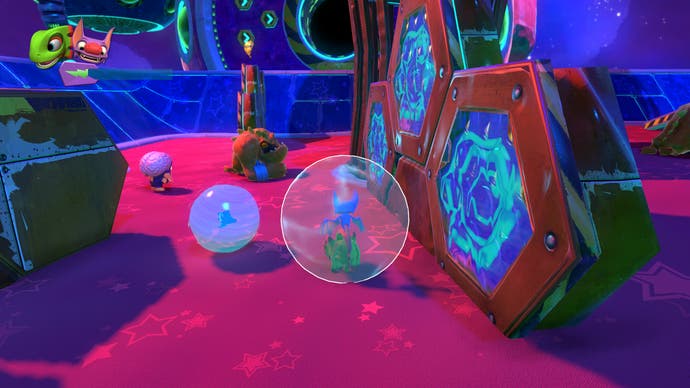
While searching for those Pagies - most locked in cages, or handed out by each world's eccentric residents once you've solved a puzzle or two - you'll also hoover up Quills, over a thousand in all. These are spent on a subset of abilities, doled out by the game's ubiquitous shopkeeper Trowzer Snake, but their true value is how they guide you through the landscape, tracing paths up and around cartoon monoliths or through crops of over-sized mushrooms. It's a far cry from today's open worlders, where collectible items suffuse the terrain indiscriminately rather than helping to articulate it to the player.
The game's five book worlds - which must be expanded by spending Pagies before you can get at their choicest areas and treasures - are at once Yooka-Laylee's biggest draw and, in the end, greatest disappointment. The first is a gorgeous, breezy slab of pop Aztec architecture that reaches up from jungle gullies to drifting island-chains, a statement of intent that is always a pleasure to return to (not least for the discovery of what feels like a deft Dark Souls reference near the spawn). The last you'll encounter is also a gentle marvel, a cosmic marriage of Pirates of the Caribbean and The Jetsons, distinguished by wallowing asteroids and a golf course erected over a black hole.
Those in between are a mixed bag, however, both overly beholden to stereotype and slightly scattershot in their activity and obstacle design. One of the game's larger problems is that there's rarely the sense, as in the best level-based platformers, that a realm has been constructed around unique concepts that are elegantly paid out as you make yourself the master of associated abilities. There are puzzles that are specific to each world, including the option to transform into various goofy vehicles care of an absent-minded octopus professor, but by and large, going from book to book is more a question of altering the mood than the mechanics.
The inevitable ice-themed environment does feature a couple of vivid dungeon puzzles, amongst them a grotto that shifts to an isometric (or as the writing would have it, "icymetric") perspective, but is otherwise a palette-swap with some extra-slippery slopes. The subsequent casino-themed level does a few intriguing things with the ability to refract laser beams through Yooka while he's invisible, but boils down to clusters of fruit and pachinko machines that feel more like a break from the game than a meaningful continuation of it. Least appealing of all is the Halloween world, a dreary swamp's worth of floating logs, bulbous pipes and grappling points, with the odd glowering pumpkin thrown in at random. Regardless of their success as platforming playsets, each environment is worth visiting for its layered, throwback orchestral score, which ratchets up and eases off organically as you explore to vary the ambience.
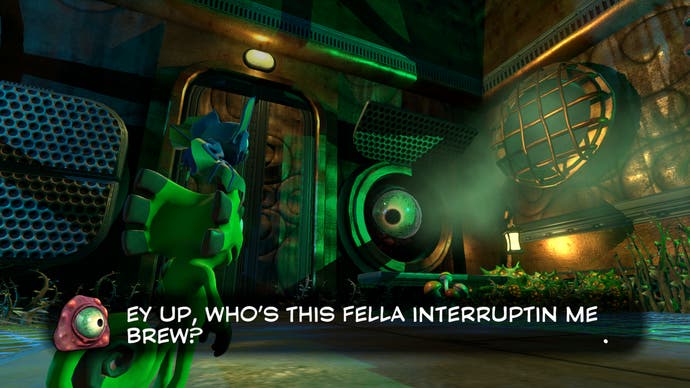
The handling has its ups and downs, too, generally fluctuating in quality by the move or puzzle. The game's camera is dependable enough when it comes to bouncing between platforms or gliding through hoops, but anything that actually requires a measure of precision - say, using Yooka's tongue to lasso a grapple point or a berry during a timer-based puzzle - can be a headache. The protagonists themselves are pretty responsive for the most part, but there are some notable wobbles. You'll eventually learn to fly, for example, which makes back-tracking across landscapes to scoop up far-flung Pagies a cinch, but saddles you with a large turning circle that often throws the camera into disarray. The game's alternate forms can also be a pain to steer, particularly the ice world's snow plough, though having to compensate for the extra inertia is admittedly the point of the puzzles in question.
Hiccups of this sort don't cripple Yooka-Laylee, but they do scrape the shine off a project that is already a mite too comfortable with the glass ceiling its premise imposes, for all the flurries of fourth-wall-breaking humour. Criticising the game for being faithful to inspiration may seem churlish - Playtonic has never pretended to be doing anything other than reviving a beloved formula, warts and all. But it's hard not to look at some of the quirkier games the studio's founders were responsible for at Rare, including 2008's underrated Banjo & Kazooie: Nuts and Bolts, and not feel like punches have been pulled. Still, as a whole Yooka-Laylee is more self-deprecating than it needs to be. This is a sumptuous, diverting homage to a bygone era in game design that should keep fans of the old school hooked, even if it doesn't set the world on fire.
